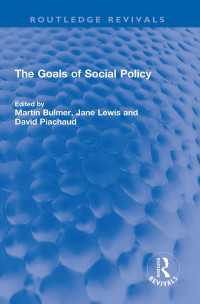- ホーム
- > 洋書
- > 英文書
- > Literary Criticism
基本説明
Argues that the Christian humanist occupies the "radical middle" between church and state, past and future, faith and reason, as it makes a compelling argument for reconsidering how this movement informs and sustains much of our great literature.
Full Description
Among the prominent intellectual debates of the twentieth century was the literary clash between a dogmatically relativist modernism and a robust revival of Christian humanism. In ""The Return of Christian Humanism"", Lee Oser ranges widely over English literature, from Chaucer to Beckett, taking in the thoughts of critics, philosophers, and theologians in order to compare the fruits of Christian humanism with those of its rivals, both secular and religious. Oser reveals that Christian humanism informs a broad and important literature and maintains that it encourages a genuine diversity of thought based on reason, nature, and the accomplishments of artistic genius. He first describes how the liberal humanism of Matthew Arnold gave way to the Christian humanism of G. K. Chesterton, then proposes the work of J. R. R. Tolkien as a litmus test for modern critics - contradicting those who dismiss it as childish and defending its imaginative power. And in pointing out a strong Augustinian strain in T. S. Eliot, Oser shows that this poet can best be understood in comparison with Chesterton and Tolkien. Along the way, he tackles such issues as the canon and the education of taste and takes on some of today's most prominent literary critics, including Helen Vendler and Harold Bloom. Writing at the interface of literature and religion, Oser challenges the assumption that Christian orthodoxy is incompatible with humanism, freedom, and democracy. He argues that contemporary academic culture has overlooked Christianity's gifts to literature and civilization, and he shows humanism's influence on the shape of Western cultural history, as well as the consequences of humanism for philosophy and theology. ""The Return of Christian Humanism"" argues that the Christian humanist occupies the ""radical middle"" between church and state, past and future, faith and reason, as it makes a compelling argument for reconsidering how this movement informs and sustains much of our great literature. In addition to reopening this important debate, Oser argues that Christian humanists are often more genuinely tolerant than are champions of multiculturalism and diversity - and that Christian humanist authors offer a balanced yet dynamic view of art and life.







